Brunello Cucinelli on philosophy, business and family
Cashmere billionaire Brunello Cucinelli’s humble beginnings instilled both a love for beauty and the values that permeate his business.
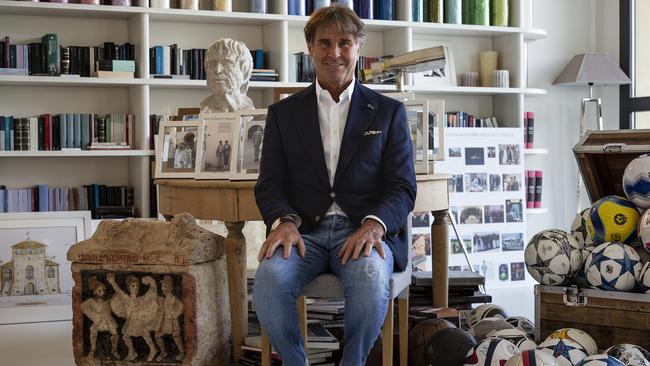
Brunello Cucinelli shares his spacious office with colourful soccer balls, family wedding photos, and a few items from his latest clothing range spread across the floor.
Glass tubes filled with vibrant fluffy cashmere samples line one of the walls, portraits of US presidents Abraham Lincoln and John F. Kennedy are among the photos on the other.
It’s an eclectic collection. But the Italian billionaire, who built a global clothing empire from a single cashmere sweater, admits that one of the most precious objects in the room is a decorative stone box he witnessed being extracted from a 2500-year old Etruscan tomb in southern Italy.
“They called me when they were about to open the tomb and there were six of them inside,” 68-year-old Cucinelli tells WISH with childlike enthusiasm. “It gave me a beautiful feeling I will never forget.
Within minutes the colours immediately started to fade. We restored it and the cultural superintendency gave this to me as a custodian for safekeeping so people could see it.”
Art and beauty, history and philosophy, are among the businessman’s many passions, so it is hardly surprising he chose the picturesque 12th century village of Solomeo in the rolling hills of Umbria as the location for his global headquarters.
Over the decades he has restored the village and added a modern industrial complex, as well as a vineyard and fruit orchards in the valley below.
Cucinelli and his wife Federica, who was born in Solomeo, live in a historic two-storey villa they refurbished in the centre of the village.
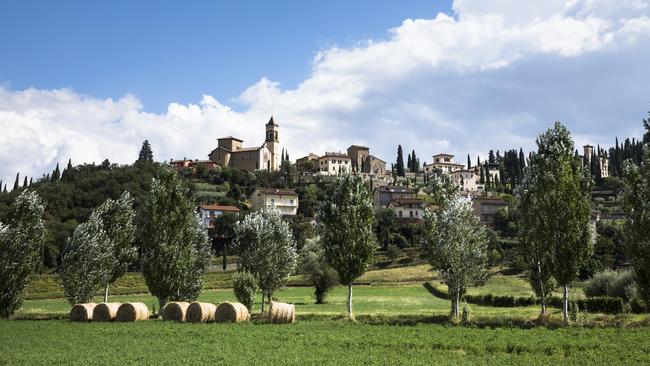
Their daughters, Camilla and Carolina, live nearby with their own families and they and their husbands also work for the luxury brand.
Solomeo is the beating heart of Cucinelli’s business and the perfect backdrop for him to reflect on what he learned from the ancient Greek philosophers and his favourite Roman emperors, including Hadrian and Marcus Aurelius.
“When I read Hadrian’s memoirs as a boy it changed my life,” he says. “Hadrian said he felt responsible for the beauty of the world and that books had shown him the meaning of life. I think there are human beings who have changed the world who remain immortal.”
Born in the small town of Castel Rigone just a few kilometres away, Cucinelli came from a family of poor wheat farmers.
He lived without electricity or running water until he was a teenager. In a remarkable rags-to-riches story, his personal worth today is estimated to be $1.7 billion.
“I think the poverty my family gave me was a source of inspiration for my life. Of course, it’s difficult to recognise poverty as a gift, but I think it was,” he says.
“Without electricity you have a beautiful relationship with creation. When the sun goes down, light comes only from the stars. When you have no light, your eyes are always looking towards the sky.”
Cucinelli still appreciates the values his family instilled in him and says they define his approach to business today.
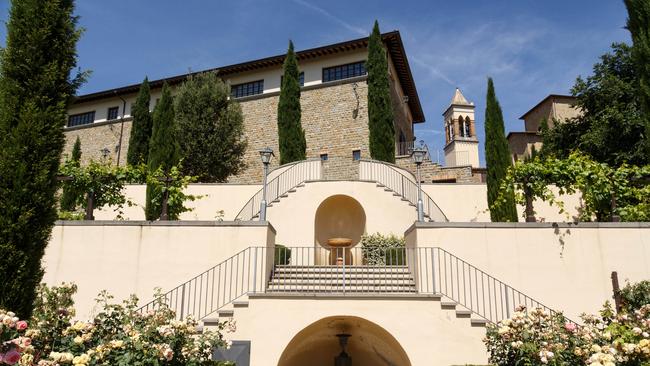
“The first bale of grain we harvested went to the community at my grandfather’s behest. From there I learned the great theme of life: the balance between profit and giving something back.”
Cucinelli remembers seeing his teary-eyed father subjected to humiliation at work. When he was 15, his parents sold their farm and relocated to nearby Perugia.
A couple of years later, his passion for philosophy and literature was inspired by conversations at a local café, and the political upheaval of the late ’60s and early ’70s intensified his interest in social and cultural issues.
After leaving school, he obtained a diploma as a building surveyor before transferring to engineering, but eventually dropped out of university.
In 1978 he set up a small company with only one employee with the goal of producing cashmere, but the man now known as the Cashmere King could never have imagined creating a global luxury brand that is about to open its first store in Australia in Sydney’s CBD.
“When I started with cashmere I was a small artisan; I didn’t know how to be an innovator,” Cucinelli recalls.
“From a small beginning, everything started to develop slowly. On the day I sold my first 53 pullovers, I felt like Alexander the Great. That feeling never changed, just the quantity.”
Cucinelli’s designs are popular around the world and demand is growing for the ready-to-wear collections the luxury brand produces for men, women and children, as well as its home furnishings, shoes and handbags.
Among Cucinelli’s recent additions is a line of eyewear created in partnership with the hip Los Angeles brand Oliver Peoples.
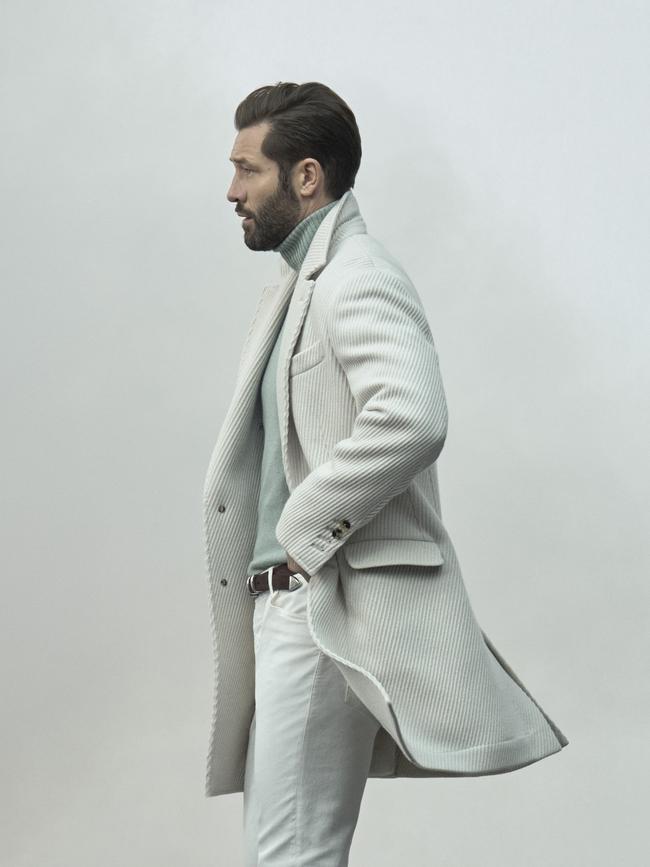
Cashmere is a highly prized fibre because it is soft and lightweight. Cucinelli sources his wool from Hircus goats that are raised in Mongolia and Inner Mongolia.
At his Solomeo factory, the delicate fibres are transformed into a range of high-quality garments, including sweaters, cardigans, coats and jackets, that sell for thousands of dollars apiece.
Cucinelli likes to describe the brand’s style as “sporty chic”, and he looks the part himself when he shows up for our interview wearing a crisp white shirt, denim jeans and sneakers.
His approach has helped to reshape the definition of corporate boardroom attire, and resonated with the tech titans of Silicon Valley and the powerbrokers of Hollywood.
Modern moguls including Jeff Bezos and Mark Zuckerberg are among his biggest fans, and the late Steve Jobs, Apple’s co-founder, was known to order his signature black turtleneck from Cucinelli.
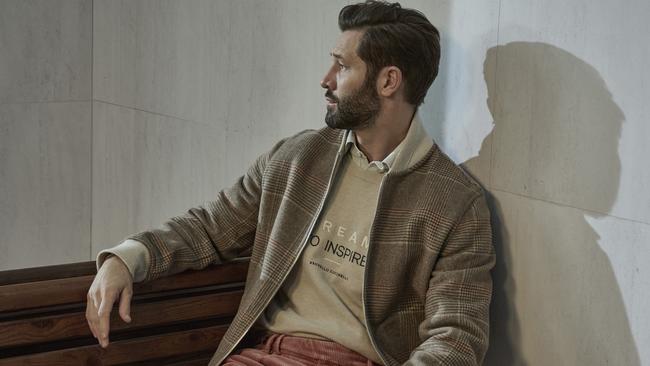
The company has gone from strength to strength since it listed on the stock exchange in 2012. At a time when many luxury brands are feeling the impact of the Covid-19 pandemic, Cucinelli has defied expectations and surprised its shareholders.
Global turnover rose more than 30 per cent in 2021, with net revenues exceeding €712 million (more than $1 billion).
Robert Burke, a New York fashion consultant who heads his own firm, describes the brand as “the pinnacle of taste”, and says its Italian heritage, impeccable quality and modern sensibility is the key to its success.
“Since day one, the brand has had a very strong identity and has remained true to that aesthetic, which is focused on quality and craftsmanship,” says Burke. “It quickly became a standard for Italian luxury products.”
Burke worked for more than a decade for designer Ralph Lauren, and later at the exclusive New York retailer Bergdorf Goodman. He says Cucinelli has become the benchmark in the luxury industry.
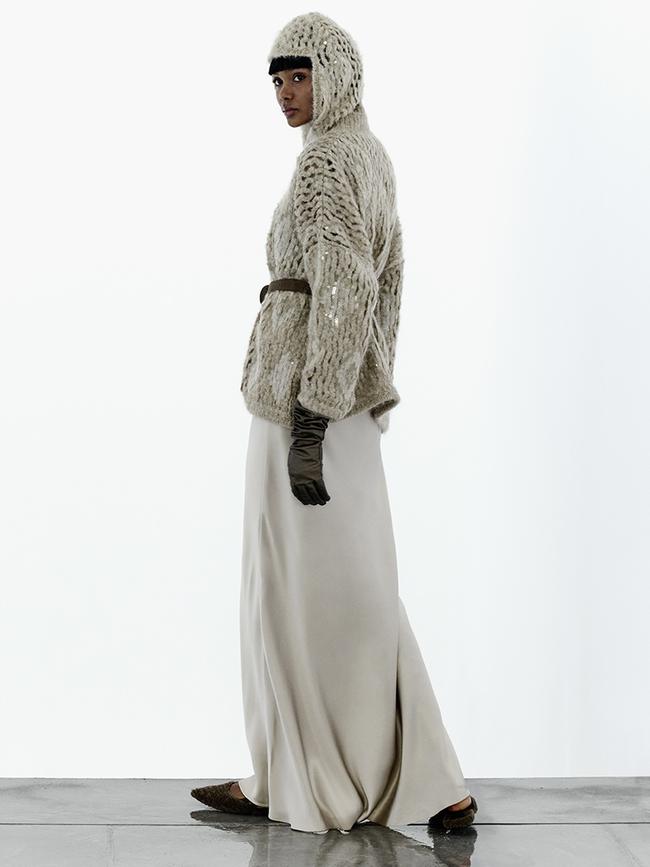
“Other top brands don’t have the same appeal that Brunello Cucinelli does,” he says. “Cucinelli stays incredibly focused on its products and its customers, who it knows so well.
“They have also become excellent retailers of their product and have created a unique and special experience with their stores. We’re seeing brands like Chanel start to take a similar retail approach but Cucinelli is ahead of the curve.”
Despite the ongoing conflict in Ukraine, the company recorded further growth in the first half of 2022 and the long-term outlook for cashmere clothing also looks positive.
Chicago-based research firm Quad Intel estimates the global cashmere market will grow to $US3.3 billion ($4.7 billion) by 2028.
Cucinelli’s market foothold is across every continent, but more than 40 per cent of its sales are in Europe and 30 per cent in the US. The brand now has 114 stores, with the latest opening in Dubai, Gstaad and Palo Alto, just outside San Francisco.
Now Cucinelli, the company’s CEO and creative director, is enthusiastic about attracting a generation of new clients in the Australian market.
“Do you know that I have never been to Australia?” he says. “Today all the 18- to 20-year-olds want to go to Australia. There must be something fascinating there – there’s a positivity about Australians. From the outside, we see your country as a beautiful place that is rebalancing the relationship with nature, with creation.”
Cucinelli never tires of speaking about the need for balance. In fact, it’s something of a personal mantra.
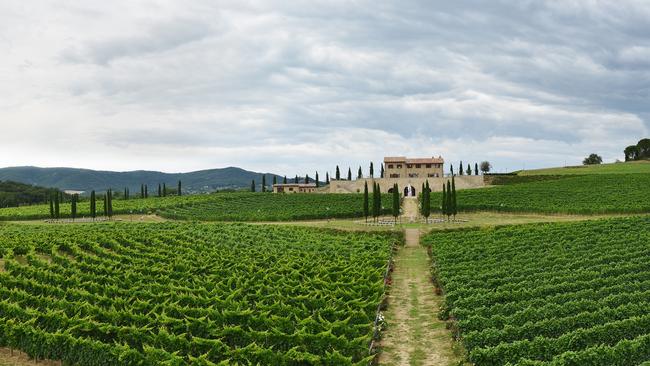
Whether it is about balancing science and nature or balancing work with rest, he is committed to promoting what he calls “humanistic capitalism” so that workers can have more downtime to relax and appreciate the beauty of literature, art or nature.
Solomeo exemplifies what he wants to achieve. Among the medieval buildings Cucinelli has restored is the Church of Saint Bartholomew, and he has built an amphitheatre and theatre for live performances featuring Italian and international actors such as Tilda Swinton and John Malkovich.
He also opened a school for contemporary arts and crafts to develop tailoring and other skills for a new generation, and his latest project is a universal library, due to be completed in 2024.
Cucinelli’s corporate office, once inside a medieval castle in the village, was transferred down the hill to his global headquarters a few years ago.
A modern industrial complex surrounded by manicured lawns and fountains, it houses the company’s administrative offices and production plant. Natural light bounces off the white walls of the factory in a bid to create the most desirable environment for the company’s 1200 workers.
Large reproductions of Renaissance masters Michelangelo and Raphael hang from the ceiling above the factory floor and the production line is surprisingly quiet.
Workers sit in front of high-tech knitting machines that move rapidly backwards and forwards across spools of fine wool, producing delicate pieces that will be assembled into complete garments at machines nearby.
Every garment will undergo a rigorous examination further along the production line to ensure that there are no flaws, before being shipped around the world.
Despite having the latest technology inside his plant, Cucinelli has little time for TV or technology in his personal routine.
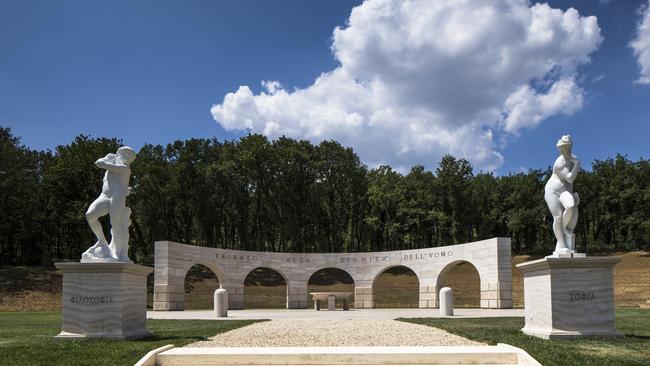
There is no computer on his office desk, only paper and pencils. When he goes home, he would rather stare at the flames of an open fire or read Socrates than play with the latest device.
He wants his employees follow his example. They all take a 90-minute lunch break at the inhouse restaurant, where they pay €3.20 (less than $5) for three courses, and they stop work at 5.30pm whether they’re on the factory floor or in the accounts department.
“Technology is stealing our souls,” says Cucinelli. “Here we have a good balance between technology and humanism. You work until 5.30pm and then you disconnect yourself. I don’t want to be responsible for altering your spiritual balance.”
Cucinelli’s approach has won him plenty of accolades, few of which impressed his late father, who before he died at the age of 100 this year told him the only thing that mattered was to be a “decent” person.
The entrepreneur has received honorary knighthoods from the Italian government and last year was named Designer of the Year by a British fashion magazine.
But one of his greatest thrills was being invited by the outgoing Italian prime minister, Mario Draghi, to address the G20 meeting in Rome last year.
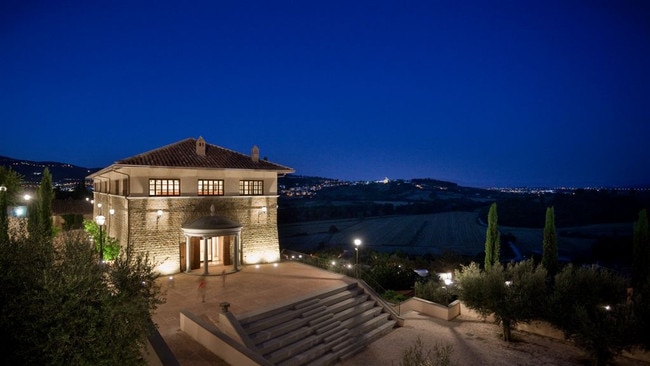
He told the leaders present, including British Prime Minister Boris Johnston and French President Emanuel Macron, about the philosophy that shaped his corporate success, and reminded them of their personal responsibility to balance the demands of capitalism with the dignity of the workforce.
“I wanted a company that made healthy profits, but did so with ethics, dignity and morals,” he told them. “I wanted human beings to work in slightly better places, earn a little more money and feel like thinking souls at work.”
Anxiety about Ukraine and its impact on energy prices has created economic uncertainty, and fears of galloping inflation and a global recession.
In Italy, Draghi’s recent resignation has provoked a new round of political upheaval ahead of the September elections.
Cucinelli is not worried. He prefers to focus on human kindness, how the Italian health service managed the pandemic and progress the world has made towards reducing global poverty.
“War makes me sick but I believe in the wisdom of human beings,” he says. “This will be a golden century.”



To join the conversation, please log in. Don't have an account? Register
Join the conversation, you are commenting as Logout